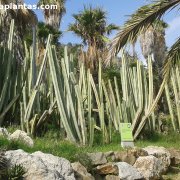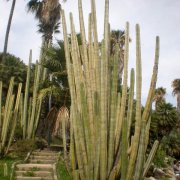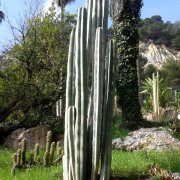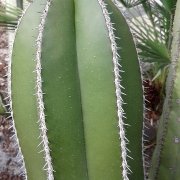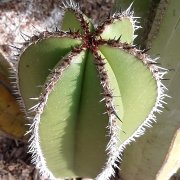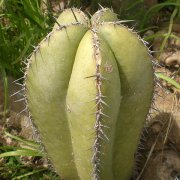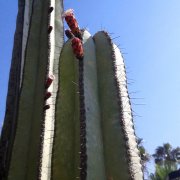Care of the cactus Pachycereus marginatus or Mexican Fence Post Cactus |
|
The genus Pachycereus, family Cactaceae, comprises 10 species of cacti native to Mexico and the southwestern United States. Some species are: Pachycereus marginatus, Pachycereus pecten-aboriginum, Pachycereus weberi, Pachycereus pringlei, Pachycereus schottii. Common names: Central Mexico Organ Pipe, Mexican Fence Post Cactus, Organ Cactus. Scientific synonyms: Stenocereus marginatus, Cereus marginatus, Lophocereus marginatus. This species is native to Central Mexico. They are large cacti with a columnar body and dark green or grayish color that can branch from the base and reach 7 meters (23 feet) in height. They have 5-7 sharp ribs (they become rounded with age) filled with woolly areoles with short, thick radial spines (up to 7) and 1-2 straight central spines. They produce red flowers on the upper part of the stems; They are bell-shaped and bloom in spring. These fast-growing cacti are used to form hedges and barriers, in cactus and succulent gardens, in rockeries, and in pots when young. Pachycereus marginatus needs full sun exposure and high temperatures. They do not withstand humid winters or temperatures below 8 ºC (46.4 ºF). The soil can be a mixture of 50% leaf mulch and 50% coarse sand. Transplant in early spring. Water moderately, waiting until the substrate has completely dried. In winter do not water. Fertilize monthly with mineral fertilizer for cacti in spring and summer. They do not need pruning. They resist pests but are sensitive to excess humidity or irrigation. They are easily propagated from cuttings or by seeds sown in spring. |
Images of the cactus Pachycereus marginatus or Mexican Fence Post Cactus |
Find plants
Pachycereus marginatus or Mexican Fence Post Cactus | Care and Growing
© 2024 FavThemes
